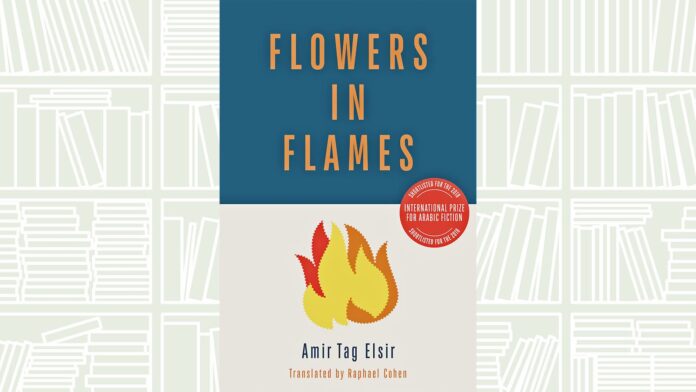CHICAGO: Shortlisted for the International Prize for Arabic Fiction in 2018 and newly translated into English in 2022, “Flowers in Flames” is by award-winning Sudanese author Amir Tag Elsir.
Weaving a narrative made up of ethereal dreams and harsh wakefulness, Elsir introduces readers to Sur, a city where Muslims, Christians, Jews, Buddhists, Africans, and Europeans peacefully coexist.
Among the residents is a small group of Copts including Khamila, the narrator of the tale. Between Khamila, her father Jamari Azer, the wealthiest corn merchant in the city, and a host of community members, residents live predictable lives until rumors of a threat emerge and life is turned upside down.
Translated into English by Raphael Cohen, Sur appears like a light and is extinguished just as fast when the Righteous One and his extremists overrun the city.
Through Khamila, readers discover Sur, a rich city built by the multiple personalities that call it home. Governed by the Turk Yusuf Dameer, the residents have eased into life, providing each other with sustenance and engaging relationships. In a large melting pot like Sur, there are bound to be religious and patriarchal boundaries that are not crossed, but everything is dealt with peacefully.
Khamila is a young Copt in her twenties and is curious about the world around her. She lives in a city that has moved between cultures and religions throughout the ages, creating a special place to call home. But the welcoming atmosphere diminishes when war arrives.
According to Khamila, Sur is a city, “that had always swung between order and chaos, between civilization and a charming primitiveness, but had always been a home for every community and faith.” And it is for this reason that the Righteous One and his extremists target Sur.
As people begin to disappear, and food becomes scarce, Khamila’s world fades. She realizes that she may never see the people she once loved and lived with again. The comfort and safety that she once knew is snatched away in an underground bunker in Majd Square where the women are kept safe and then ultimately captured.
Like Sur, a transitional city between ancient and modern, accommodating to the various cultures and religions it represents, the attack represents a transitional time in Elsir’s fictional world, from liberal and open-minded to extreme conservative thought. Caught in the crosswinds are the people who have no desire to be forced into a new normal.
Elsir masterfully brings readers into Sur to fall in love with its inhabitants and then quickly snatches it away when extremist ideology befalls them. His story is one of a vibrant city that disappears overnight and with it the people who have shaped it for centuries.


